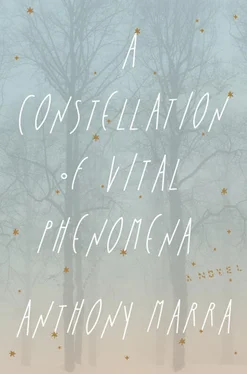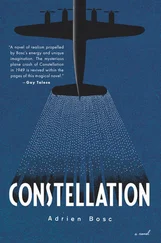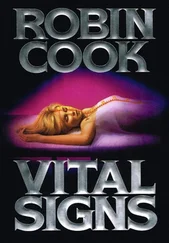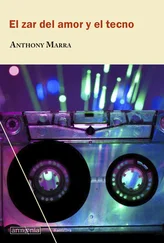“According to hadith , he who nightly recites the sixty-seventh surah will be spared a torturous death,” the blue-eyed imam lectured one evening from the upturned bucket. “You must all know that. You must all count on that. The surah describes the Merciful’s creation of all seven heavens, each one above the other. The Throne of God sits atop the highest heaven, and lanterns adorn the lowest. The lanterns are our stars and comets, this firmament above our very heads.”
He glanced to the sky and lowered his face. He pulled a matchbook from his pocket and struck it. Soft yellow light gloved his hand. “Take heart, my friends; we are already among the righteous. We are already with God.” He raised the match to his face, and his shadow was cast across the Landfill clay. “Here is the lantern of our lowest heaven.”
From somewhere far above them, a name was called through the bullhorn speaker. The imam stepped down from the bucket and walked toward the ladder. “With God,” he said, as he stepped onto that first and lowest rung.
Night fell. The moonlight covered Ramzan like a flimsy bedsheet. He lay on a strip of once-burgundy carpeting, which would capsize in the mud if he sat up, turned over, yawned, or thought too hard. The stars shone much brighter here. The gauzy light of the Milky Way canopied Pit B, the nearest thing to a roof. Nothing in this or the next world was worse than physical pain. In the afterlife, as no more than a soul, he would be without a body to beat, skin to peel, blood to flow, eyes to gouge, fingernails to pry, lungs to drown, ventricles to stop, and so the retribution of God would always be gentler than the retribution of man. He held on to this one truth the next morning when his name was called through the bullhorn. He held on to it as he climbed the ladder and saw, framed by the rungs, the names of those to follow. When ordered to disrobe, he complied. When one of the interrogating officers wanted a better view of the cratered skin that had been his scrotum, he complied. Those scars were seven years old. During his first detention in the Landfill, in 1995, in the first war, he had refused to inform. They had wrestled down his pants, shown him the bolt cutters, and still he had said no. Screaming, thrashing, with his manhood half severed, he had said no. He had done that, and now he was ready to start saying yes.
He would have confessed everything, but they didn’t ask, weren’t interested, threatened to cut out his tongue and put pliers to his teeth if he spoke one more fucking word. Electric wires were wound around his fingers. A car battery was drained into his bones. God might have been watching, but it wasn’t God’s finger on the battery switch. The interrogating officers didn’t speak. Instead he was an instrument they played, performing a duet, and in their own way they conversed through his sobs. They both wore very shiny shoes. That was all he would remember.
He passed out and was resuscitated by buckets of cold water so frequently that even the electricity in his veins couldn’t warm him. The interrogating officers stepped out of the room to have a rest, and new officers entered. He had been in interrogation for three hours and they still hadn’t asked him a single question. In a moment of calm, when the interrogators were asking each other about their weekends, he tried to find the beat of his heart among the burps and squelches, real and unreal, emanating from his blistered body. Before the second car battery was attached, the new interrogator guided Ramzan to the next room. He had trouble walking. He had forgotten torture could be so exhausting. The new interrogator, the one with less shiny shoes, held him upright, using his whole body as a crutch, and helped him walk. He carefully wiped Ramzan’s forehead with a handkerchief before opening the door to the next room. A white wooden table scored with fingernail scratches stood in the center of the room. In this realm of ceased expectation, the aquarium at the far end didn’t surprise him. The blue-eyed imam was brought through another door. He didn’t recognize Ramzan, or if he did, he refused to acknowledge the fact of his shame before a disciple. The imam was held down against the table. One of the guards pulled down his trousers and underwear. The interrogator with less shiny shoes, who had, moments earlier, so tenderly guided Ramzan down the corridor, went to the aquarium. He put on a pair of thick rubber gloves. He reached into the aquarium. The blue-eyed imam didn’t know what was happening. From his vantage, he saw only the wall and the arms holding him. The imam couldn’t see what Ramzan saw. He couldn’t see the interrogator with less shiny shoes approach with the bucking, writhing black belt in his gloved hands, and the interrogator couldn’t see the imam’s face. The imam didn’t understand what was happening, and neither did Ramzan. But when the interrogator with less shiny shoes pressed the eel, teeth first, between the imam’s pale buttocks, it could be nothing else. The room went blurry, then black, and the imam’s shriek followed Ramzan into unconsciousness. When he woke, he was back in the first interrogation room. The interrogator with less shiny shoes crouched behind him. His hands were wet. Ramzan promised everything, and the interrogator, like the parent of a child too old to believe in ghosts, watched him with disappointment, his clear eyes saddened by Ramzan’s sincerity. The interrogator took off his jacket, rolled up his sleeves, laid the live wires on Ramzan’s chest and mapped the border of their shared humanity. Ramzan offered his soul. He begged to be enslaved. The known universe contracted to the limits of the cement floor, and on it, the interrogator was both man and deity, prophet and god. By ten o’clock the interrogator with less shiny shoes asked his first question. By eleven the electrical wires were unwound from Ramzan’s fingers. By noon he was allowed to dress. By one he was on the FSB payroll. He kept thanking the interrogator with less shiny shoes. Again and again and again, he thanked the man, and never before had he expressed such earnest gratitude. He would have followed the interrogator with less shiny shoes anywhere. It was God he found at the other end of the electrical wires. He was given a satellite phone and a three-hundred-page manual written in German, French, English, and Japanese. He asked after Dokka, asked if he could buy back his friend’s life. Yes, the interrogator with less shiny shoes told him, provided the village could raise a fifty-thousand-ruble ransom within a week; otherwise, the ransom would jump to seventy-five thousand for his corpse. Ramzan reached into one of the many pockets of the overcoat they returned to him, and timidly pulled out the plastic-wrapped bills. No one had thought to check his pockets. “This is only half,” the interrogator with less shiny shoes told him. “But I am, above all, a reasonable man.”
Ramzan waited for Dokka on the concrete stairs of the Refuse Disposal Administration. A hundred meters away, at the bottom of Pit B, his funeral was taking place. Perhaps one of the others sat on the imam’s upturned pail, intoning the name of Ramzan Geshilov, the good and righteous man who had refused to inform and had died for it in the Landfill seven years earlier and only now was having his funeral.
The pebbles at his feet were round and pockmarked. His bare toes curled around them. There was no guilt, no shame, those would come later, but for now, just the blanketing white noise of relief, of this breath, of non-pain. He wore the rings of ten burn marks on his fingers. For the first time in his life he believed without reservation in the existence of a kind and generous God, as desert thirst teaches one to believe in rain. After an hour his red truck turned the corner, followed by a dust billow that swept past when the truck stopped. Dokka’s gasps filled in the open passenger window. Leaving the engine idling, the interrogator with less shiny shoes climbed from the driver’s side. He held up a red plastic bag, like a fish he had proudly caught. Ten fingers floated in the blood. “Your friend gets these back when I get the other twenty-five thousand,” said the interrogator with less shiny shoes.
Читать дальше











